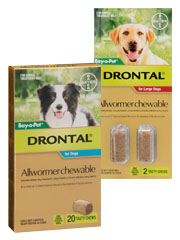Regular intestinal worming should be an integral part of the regular health care routine for your dog. Dog wormer are available for different types of worms.
Intestinal worms are gastrointestinal parasites. They are readily spread between dogs and some have important human health implications. Implementing a sustained, regular wormer program can help prevent your dog from developing a significant worm burden and also reduce the risks to your family and others.

The common intestinal worms in dogs are Roundworms, Hookworms, Tapeworms and Whipworms and should be treated with a wormer pet medication.
Why is it Important to Use a Wormer?
Roundworms (Toxocara canis and Toxascaris leonina) are quite common in dogs. Transmission of roundworms can occur through direct ingestion of the ova (eggs) from other animals or the environment or by ingesting paratenic hosts. Transmission can also occur across the placenta for T.canis. Hence puppies can be born already infected with roundworms. Roundworms live primarily in the small intestine, but immature forms can migrate through body tissues causing liver and lung damage in the dog. Wormer symptoms are therefore associated primarily with gastrointestinal signs. Diarrhoea, stunted growth, poor hair coat, weight loss or poor weight gain in young animals are common symptoms. Young puppies, especially runts, with large pot-bellies may have severe roundworm infection.
Hookworms (Ancylostoma spp and Uncinaria spp) also live in the small intestine of infected dogs. Transmission is usually via ingestion but can also occur through the mother's colostrum or via skin penetration. These worms attach to the lining of the intestine and ingest intestinal mucosa and/or blood depending on the species. Hookworms can affect any age dog but clinical signs are worse in young animals. Stools which are black or contain fresh blood may be seen, as may diarrhoea, failure to thrive and signs of blood loss or iron deficiency anaemia. The prognosis is guarded in severely affected puppies.
Tapeworms are transmitted when the dog eats an intermediate host. Dipylidium caninum, Taenia spp and Ecchinococcus spp are the ones of most interest. The most common tapeworm in dogs, D.caninum, uses fleas and lice as an intermediate host. Wild animals such as rabbits are often the source of Taenia spp, whereas offal is the usual source of Ecchinococcus spp. A prime objective of tapeworm wormer control should incorporate methods of control of the intermediate hosts. Adequate flea control and prevention of animal predation is essential. Tapeworms do not often cause significant disease in dogs. The primary sign is that of irritation around the anal region. Owners may see segments of the worm in these regions or on the animal's faeces. They are often reported as white rice grains. Ecchinococcus spp are a human health hazard.
Whipworms (Trichuris vulpis) are transmitted via ingestion of the worm egg from the environment. They live in the colon (large intestine) and caecum, burrowing into this tissue. Wormer symptoms are associated with bleeding (blood in stools) and protein loss.
Diagnosis of intestinal worms in dogs is done by a veterinarian. Any dog showing gastrointestinal signs, especially diarrhoea or blood in the stools, any puppy failing to thrive, and any dog "scooting" (dragging its rear end along the ground) should be checked by your veterinarian. Diagnosis principally involves faecal testing. The faeces are prepared and examined under a microscope. The presence of eggs gives a diagnosis.
Common Wormer Prevention and Treatment
Wormer treatment and prevention of intestinal worms is readily available. All dogs should be on a regular intestinal wormer program. This generally begins at 2 weeks of age and is done every 2 weeks till 12 weeks, then monthly till 6 months, then every 3 months thereafter. Your veterinarian will advise you if a different wormer schedule is more appropriate for your dog. Numerous products are available for intestinal wormer treatment and wormer prevention in dogs. Ensuring that the chosen wormer covers all relevant worms is essential in ensuring complete protection of your dog. Examples of wormer products available in Australia include Advocate, Drontal, and Sentinel Spectrum wormers. For effect against tapeworms, the active wormer ingredient praziquantel is required. Control of intestinal worms (and reduction of human health hazards associated with them) should also involve environmental wormer control. All dog faeces should be removed rapidly and disposed of, fleas and lice should be treated, and the use of offal in home-made diets should be avoided. Preventing the dog from scavenging and accessing rodents and wildlife would also be advised.
The Importance of Wormers for Human Health
There are serious human health implications to consider if your dog has intestinal worms. Below is a general introduction to this topic. Roundworms, principally Toxocara spp can infect humans if the larvated eggs are ingested. The larvae hatch and can migrate to any body tissue, and can result in permanent visual, neurological or other tissue damage. Hookworms can infect humans via ingestion or direct skin penetration, resulting in vague abdominal pain or self limiting skin infection known as cutaneous larval migrans. Tapeworms can also infect humans and produce different symptoms depending on the species involved. D.caninum can cause diarrhoea and itching around the anus in children who accidentally ingest an infected flea. Ecchinococcus spp produce hydatid disease in humans following the ingestion of tapeworm eggs. This is a very serious disease. Your medical practitioner should be consulted to discuss the role of pets in transmission of intestinal worms and other related diseases to humans. Strict hygiene practices should be implemented when handling animals and animal excrement.
Intestinal worms in dogs are easily prevented and managed if a combination of regular worming, external parasite control, environmental factors and proper hygiene are addressed. Please discuss intestinal worms in dogs with your veterinarian and medical practitioner for further information and specific wormer advice.
![$bestSellingFleaTick[0].searchResultProduct.displayName](https://www.petshed.com/PetShed//images/brands/advantage-multi/ADV101/small-dogs-up-to-4kg/image1med.jpg)
